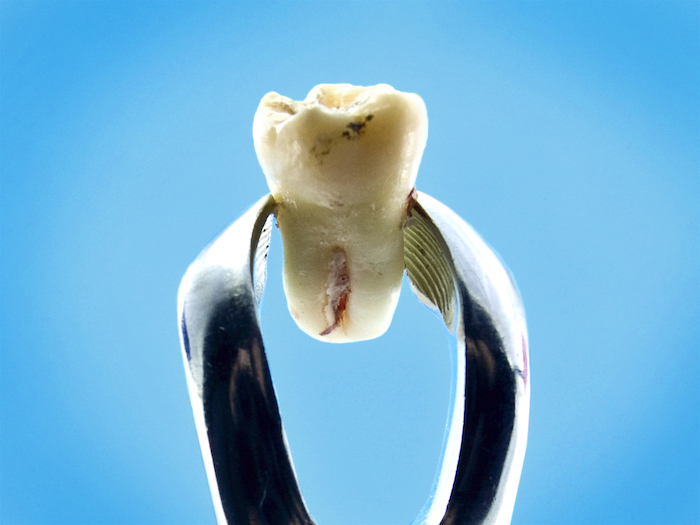5 Reasons to Get Your Wisdom Teeth Removed at 60+
There’s no age limit for extraction—especially when it will improve your quality of life.

Despite the older and wiser adage, your late teens to early 20s are actually called the “age of wisdom.” It’s a nod to the transitional time when you mature from childhood into adulthood—and also the reason why your third set of molars are called wisdom teeth, since they usually appear between ages 17 and 21.
Most people have four wisdom teeth: two on top and two on the bottom. Experts once believed they served an important purpose, back when our rough diet caused wear and tear to our teeth. But as our diet has softened and oral hygiene has improved, we don’t need our wisdom teeth to the same extent we once did.
What’s more, humans have evolved to have smaller jaws, so most people don’t have the space to accommodate those third molars. As a result, they may become impacted, or unable to erupt through the surface of the gumline.
“The importance of this tooth is less than some of the other teeth, both for aesthetic reasons—no one is going to see whether you have a wisdom tooth or not—as well as functional reasons,” says Brent Ward, M.D., D.D.S., chair of oral and maxillofacial surgery at University of Michigan School of Dentistry. “So there’s a lower threshold to remove a wisdom tooth compared to some of the other teeth in the mouth.”
That’s why many people get their wisdom teeth removed as young adults—when the recovery tends to be quicker and easier. But what if you still have them? Is there ever a reason to get them extracted now?
While it’s not common, there are some very valid reasons to consider removing your wisdom teeth as an older adult, Dr. Ward says. Here are five signs you might want to talk to your dentist about extraction.
1. You Keep Getting Cavities
Your wisdom teeth are far back in your mouth, making them pretty hard to clean, Dr. Ward says. That holds true for fully erupted wisdom teeth, as well as those that are partially erupted through the gumline. Also, some people’s wisdom teeth come in at an angle, making them even more difficult to brush effectively.
“There may not be enough room in the jaw for the wisdom teeth to come in straight,” says Dale Baur, D.D.S., chair of oral and maxillofacial surgery at Case Western Reserve University. “Because they’re angled, food has a tendency to trap around them, making a setup for long-term problems like decay.”
But if they haven’t bothered you for decades, why are you just now noticing problems? It might have to do with mobility and dexterity issues that can come with age. For instance, if you have arthritis, it could be more difficult to maneuver your toothbrush to sufficiently brush your wisdom teeth, Dr. Ward says.
And if your wisdom teeth do come in at an angle, that can mean trouble for your surrounding teeth too. “They are kind of laying on the tooth in front of them,” Dr. Ward says. “That becomes a site that is very difficult to clean—a breeding ground for plaque and bacteria.”
Treatment for cavities in wisdom teeth is the same for any others: a general filling at first, which can progress to other options like crowns or root canals, Dr. Ward says. But if you continue to get cavities in the same wisdom tooth or teeth, your dentist may recommend an extraction.
2. You Have Gum Disease (And You May Not Know It)
Teeth that are hard to keep clean can lead to periodontal disease, an infection around the gum tissue that supports the teeth, Dr. Ward says. Severe forms of periodontal disease, called periodontitis, can cause inflammation between your gums and teeth. This can lead to infection, damage to tissue and bone, and even tooth loss.
Even if you don’t feel like your wisdom teeth are causing any problems, periodontal disease may be lurking. A study in the Journal of Oral and Maxillofacial Surgery found that 25 percent of people with asymptomatic third molars showed signs of periodontal disease in a clinical examination.
That can be a big problem for your entire mouth, not just your wisdom teeth. “There is some evidence that when you have a periodontal infection in one part of the mouth, the chances of that spreading to other areas increases,” Dr. Ward says.
Seeing your dentist at least twice a year even if you don’t experience any symptoms, plus brushing and flossing regularly, can help protect your teeth and gums. Call your dentist sooner if you notice signs of gum disease:
- Red, tender, or bleeding gums
- Gums pulling away from teeth
- Loose or moving teeth
- Changes in the way dentures fit
3. You Have Heart Disease, Diabetes, or Other Health Conditions
What’s going on with your teeth can affect more than just your mouth. After studying nearly 40,000 women for an average of 16 years, researchers from the Harvard School of Dental Medicine discovered that those diagnosed with periodontal disease were 72 percent more likely to have a heart attack than those with healthy gums.
Chronic inflammation is a common factor in both periodontal disease and heart disease, Dr. Baur says. While experts can’t say for sure that one actually causes the other, people with heart disease and periodontal disease must be aware of the possibility of compounded health risks. And in some cases, this makes wisdom teeth extraction more likely.
“We see patients here all the time in their 50s, 60s, and 70s who need teeth out because they’re about to undergo some kind of open heart procedure,” Dr. Baur says. “The surgeons are worried that the infection associated with those teeth is going to get in the bloodstream and cause problems down the line.”
Conditions that compromise your immune system, like diabetes, may also leave you more vulnerable to periodontal infection, Dr. Baur says. Research shows that once periodontal disease is established in the area of your wisdom teeth, the problem is persistent and progressive but may improve following extraction of the teeth, Dr. Ward says.
If you have heart disease, diabetes, or other chronic conditions, let your know dentist know, and ask how it affects your teeth and gums. Plus, check out what else your mouth says about your health.
Subscribe to our newsletter
It's quick and easy. You could be one of the 13 million people who are eligible.
Already a member? Click to discover our 15,000+ participating locations.
Follow Us
4. Your Mouth Hurts
Not surprisingly, pain in and around your wisdom teeth can be a signal that something’s not right. It’s often caused by inflammation or infection, Dr. Ward says. The swelling due to inflammation triggers local nerves, which can cause pain.
“You also have some major nerves that travel in the jaw, and infection of the wisdom tooth can be close to those,” he says. “This may cause a more generalized pain issue.”
Pain when you bite down, or when you eat or drink or something hot or cold, can also be a sign of a cavity.
5. You Have Swelling in Your Mouth or Jaw
Symptoms like swelling in the mouth or jaw can point to a cyst or tumor. And while experts aren’t exactly sure why, wisdom teeth tend to be more commonly associated with the development of cysts and tumors compared to other teeth, Dr. Ward says. The risk is even higher when they’re impacted.
As cysts or tumors grow, they can damage tissue, other teeth, bone, or nerves. In some cases, extraction of the wisdom tooth, along with the cyst or tumor, is enough to remove the growth. “For some tumors, we’re talking about removing a large portion of the jawbone,” Dr. Ward says.
While swelling in the mouth or jaw is a common symptom of a cyst or tumor, in many cases you won’t know it’s there until your dentist finds one on a routine x-ray. That’s another reason why maintaining regular visits with your dentist is so important.
Check with your health plan for benefits information. Plus, look for dental, hearing, and vision discounts here.
Check Your SilverSneakers Eligibility Instantly
SilverSneakers members can go to thousands of gyms and fitness locations across the nation, plus take exercise classes designed for seniors and led by supportive instructors. If you have a Medicare Plan, it may include SilverSneakers—at no additional cost. Check your eligibility instantly here.
Already a member? Get your SilverSneakers member ID and exclusive fitness content by logging in to or creating your online account here.





